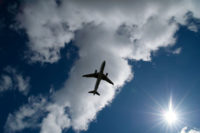 The Federal Aviation Administration (FAA) has issued a new rule to enhance aviation safety by requiring scheduled airlines to install ice detection equipment in their existing fleets or to update their flight manuals to make sure crews know when they should activate their ice protection systems.
The Federal Aviation Administration (FAA) has issued a new rule to enhance aviation safety by requiring scheduled airlines to install ice detection equipment in their existing fleets or to update their flight manuals to make sure crews know when they should activate their ice protection systems.
“We want pilots to have the best technology available to detect icing conditions so they can take the steps necessary to ensure passenger safety,” said U.S. Transportation Secretary Ray LaHood.
“This rule incorporates the latest research on aircraft icing,” said FAA Administrator Randy Babbitt. “Making sure protection systems are turned on when icing conditions are detected will help eliminate accidents that can occur if pilots fail to turn on the ice protection soon enough.”
For aircraft equipped with an ice-detection system, the new rule mandates that the system alert the crew every time they need to activate ice protection. The system can either automatically turn on the ice protection or pilots can manually activate it.
For aircraft without ice-detection equipment, the crew must activate the protection system based on cues listed in their airplane’s flight manual during climb and descent, and at the first sign of icing when at cruising altitude.
The rule applies only to in-service aircraft that weigh less than 60,000 pounds because studies show smaller planes are more affected by undetected icing or late activation of the ice protection system. Larger commercial aircraft already have ice detection equipment.
This rule addresses a longstanding National Transportation Safety Board recommendation. Click here to view the rule.
FAA issues new de-icing rule
Smaller planes more affected by ice
Looking for a reprint of this article?
From high-res PDFs to custom plaques, order your copy today!




